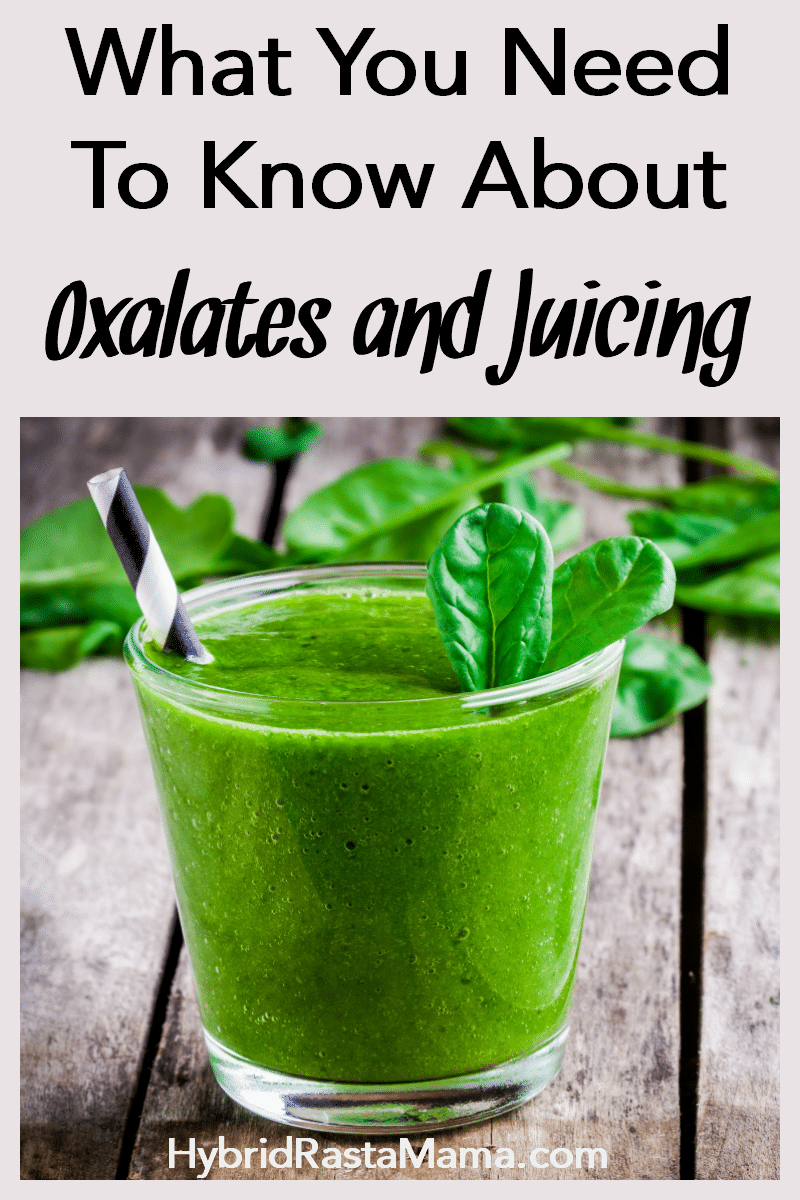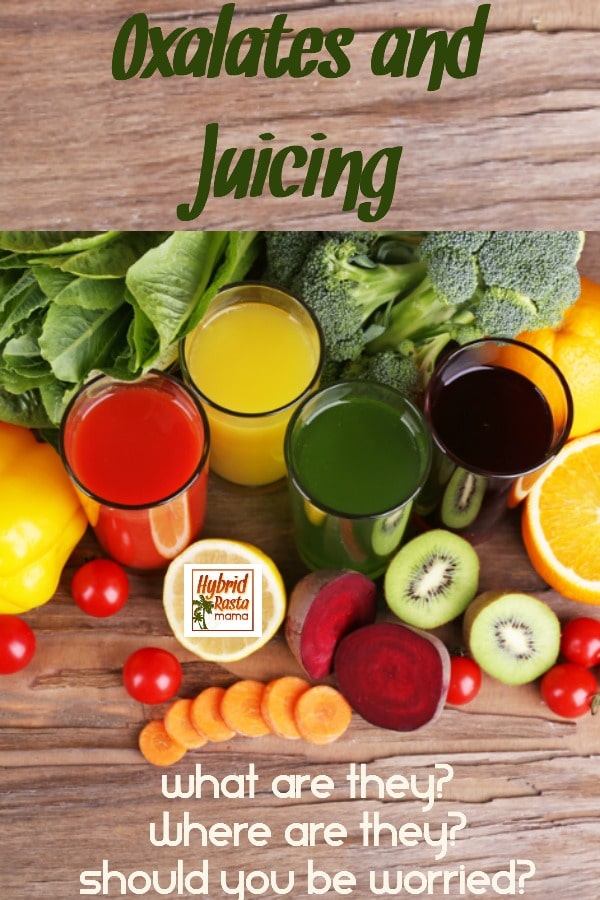Oxalic Acid (aka Oxalates) are naturally-occurring substances found in plants, animals, and in humans. In chemical terms, oxalates belong to a group of molecules called organic acids, and are routinely made by plants, animals, and humans.
Our bodies always contain oxalates, and our cells routinely convert other substances into oxalates. For example, vitamin C is one of the substances that our cells routinely convert into oxalates. In addition to the oxalates that are made inside of our body, oxalates can arrive at our body from the outside, from certain foods that contain them.
Oxalates are found in a variety of different foods such as leafy greens, nuts, seeds, most berries, certain fruits, soy and soy products, meat and dairy products.

Oxalates and Juicing
Oxalates are a controversial subject among nutritionists and health experts especially as it relates to juicing.
The main controversy surrounding oxalic acid in food is whether or not they contribute to the formation of kidney stones. About 80% of the kidney stones formed by adults in the U.S.A. are composed of calcium oxalate. Oxalic acid binds with other minerals such as calcium which form a salt known as an oxalate. Oxalic acid interferes with the absorption of calcium in foods because they bind with it, making it unusable by your body.
Remember how I mentioned that oxalic acid readily combines with calcium? One argument in favor of juicing oxalate containing fruits and veggies states this:
“If both oxalic acid and calcium are organic (raw) at the point of combination, the result is beneficial where the oxalic acid helps the digestive assimilation of the calcium. At the same time, this combination helps stimulate the peristaltic functions in our body. It is only when the oxalic acid has become inorganic (cooked or processed), that it forms an interlocking compound with the calcium that destroys the nourishing value of both. This results in a deficiency of calcium that causes decomposition of the bones. Organic oxalic acid is essential for your body and is completely harmless if consumed in organic form. It is the inorganic oxalic acid that causes trouble to your body. This is the reason why when you drink fresh raw spinach juice, your body utilizes 100% of all the minerals that spinach has to offer. But when cooked, the oxalic acid in foods becomes inorganic and may posed some health problems in the long run.
So that sounds logical right? No real harm in juicing produce with oxalates right? Not so fast…there is also this viewpoint to consider:
“Juicing may be more problematic because you are removing parts of the whole food (including fiber), and thus increasing concentrations of other substances. A smoothie, however, contains every part of the whole food, which is the way nature intended food to be consumed, which may minimize oxalate problems.
And then I stumbled across this school of thought:
“A more effective strategy is to ferment foods high in oxalates. This is my favorite strategy of course because you maintain the enzymes in the raw food, add beneficial bacteria to your diet, and increase the B vitamin content …In a 2005 study in Food Microbiology, researchers found that the soluble iron in the homemade vegetable juice in the study increased sixteen times with fermentation. What this means is that if you juice your own vegetable juice with a high iron vegetable like spinach and you ferment it, your body may absorb sixteen times more iron than it would have absorbed had you consumed the juice right out of the juicer.
And then finally, a VERY popular train of thought is to boil or steam high oxalate vegetables first, then juice them. The oxalates will literally fall off into the water leaving you with an oxalate free vegetable. But everything I have read leads me to believe that boiling produce will actually cause vitamin and mineral loss.
Sooooo….. I dug deeper and found this:
“Cooking has a relatively small impact on the oxalate content of foods. Repeated food chemistry studies have shown no statistically significant lowering of oxalate content following the blanching or boiling of green leafy vegetables. A lowering of oxalate content by about 5-15% is the most you should expect when cooking a high-oxalate food. It does not make sense to overcook oxalate-containing foods in order to reduce their oxalate content. Because many vitamins and minerals are lost from overcooking more quickly than are oxalates, the overcooking of foods (particularly vegetables) will simply result in a far less nutritious diet that is minimally lower in oxalates.
Head spinning in confusion? Yeah, mine too. What’s the real deal with oxalates and juicing.
I’m not sure that there is a right or wrong here. At the end of the day, I personally think it is wise to limit the number of high oxalate containing foods you consume IF you are prone to or already have kidney problems. If you are in good kidney health, then I suspect that rotating high oxalate containing fruits and vegetables in your juices is fairly safe. But again, that is just my opinion. I’m not a doctor.

Here is a little cheat sheet for you which is especially useful is you are worried about Oxalates and Juicing.
Fruits high in Oxalates: blueberries, strawberries, currants, lemon, lime, & orange peels, purple grapes, rhubarb, dewberries, figs, gooseberries & kiwi
Vegetables high in oxalates: beets, celery, collards, dandelion greens, eggplant, escarole, green beans, kale, leeks, okra, parsley, parsnips, peppers green, pokeweed, popcorn, potatoes, sweet potatoes, pumpkin, rhubarb, rutabagas, sorrel, spinach, yellow squash, summer squash, Swiss chard, tomato, turnip greens, watercress, yams
Fruits moderate in oxalates: apples, blackberries, raspberries, cranberries, apricots, cherries, grapefruit, green grapes, oranges, peaches, pears, pineapple, plums & prunes.
Vegetable moderate in oxalates: asparagus, artichokes, Brussels sprouts, broccoli, carrots, corn (sweet, white, or yellow), cucumber, garlic, kohlrabi, lettuce, (butter, iceberg), mushrooms, mustard greens, onions, radishes, snow peas, watercress
Fruits low in oxalates: avocado, bing cherries, cantaloupe, lemon & lime juice, mango, coconut, honeydew melon, watermelon, nectarines, papaya & raisins.
Vegetables low in oxalates: acorn squash, all sprouts (alfalfa, broccoli etc.), cabbage, cauliflower, peeled cucumber, red pepper, turnips, zucchini squash.
I don’t know about you but a cauliflower, raisin, brussel sprout juice just doesn’t float my boat. I think I will continue using my favorite oxalate containing produce in moderation.
For a full list of oxalate containing foods, click here. If you would like to try my favorite juice recipes, you can find them all in my Juice Recipes Galore article.
Thoughts? Are you at all worried about oxalates as it relates to juicing?
Sources and quotes used in this article include:
- http://www.kimberlysnyder.net/blog/2012/05/29/response-to-article-how-green-smoothies-can-devastate-your-health/
- http://www.calciumrichfoods.org/reducing-oxalic-acid-vegetables/
- http://www.whfoods.com/genpage.php?tname=george&dbid=48
- https://pubmed.ncbi.nlm.nih.gov/24384768/
- https://pubmed.ncbi.nlm.nih.gov/22332057/








Megan @ Purple Dancing Dahlias says
Love this Jen ~ thank you so much for sorting this stuff out!!
Lisa C says
Hi I just stumbled upon your blog through the donation to Sean, although I think I may have been here before…
Anyway, I totally don’t get this oxalate thing. I thought I was supposed to cook my greens to reduce the oxalates. Maybe it’s better to just not over-think it? Love the idea of fermenting juices, though. I’m gearing up to make beet kvass, actually. 🙂
Hybrid Rasta Mama says
@Lisa C I could over think health and wellness all day. You just never know which is the “right” way you know? Anyway, do what feels right for you based on what you know. That is the best we can do right????
agronymous says
you referenced an unreferenced claim! how funny! LMAO
jim says
Hi Jennifer!
First, I want to say that I find your desire to understand complex subjects refreshing.
Instead of simply handing out the usual “common sense” crap that natural foods are always better, I see that you seek the truth, even if it is inconvenient.
Secondly, it is well known that plants such as rhubarb contain so much oxalic acid that they are toxic without cooking.
To me, that indicates that oxalic acids must be decomposed by cooking (in this case by boiling).
I’m no organic chem major, so can’t say what they are broken down into.
Finally, thanks for writing the blog. If that is your photo, whatever you are doing seems to work for you!
Hong says
Follow with a hard fruit or vegetable tto clean out the machine.
Since beet skins aare very bitter, it is wise to peel beets before juicing.
The variety keeos juicing fresh and maintains your
nutritional intake.
Debsrhoades says
I suffer with a dysfunctional gallbladder and have recently added beet kvass to my diet along with dandelion greens, beets and lots of other green Leafy veg to help the gallbladder. However, a week in to taking the kvass and I have developed terrible joint pains and headaches. I’m also gluten and dairy free so eat a lot of nuts. Is kvass very high in oxalates or will they be reduced due to the fermentation process. I really thought the kvass was going to be the answer to my gallbladder issues as I’ve read so many positive things but am now feeling awful and so confused about oxalates! Any advice?
Jennifer says
I am so sorry to hear this! My first thought is… are you new to probiotic foods? If so, you could be experiencing “die off.” I don’t have a post specifically about ferments and die off but this gives you a better idea of what it is. https://hybridrastamama.com/can-you-overdose-on-coconut-oil/
Kvass hasn’t been tested for its oxalate levels, but beets are a high oxalate foods. Typically most people can tolerate kvass though as fermenting a veggie high in oxalates has been shown to drastically reduce the oxalates in question. My suggestion would be to take a couple of days off from the Kvass and see how you feel. Add it back in SLOWLY at the same time each day and see if there is a change. If you feel better then my guess is that it was too much too soon.
Ray says
Hi Debsrhoades says. I have been making Beet Kvass for a couple of years now. I agree with Jennifer. You may be experiencing die off. Start slow, maybe two onces and see how it affects you. I like to add lemon and ginger to mine during my second ferment. very delicious.
S says
You’d better check your facts and re-evaluate your high oxalate fruit list! You seem to be the only one on the web who thinks Blueberries, Grapes and strawberries are high in oxalates when a whole cup of these raw fruits has less than 4mg of oxalates each!